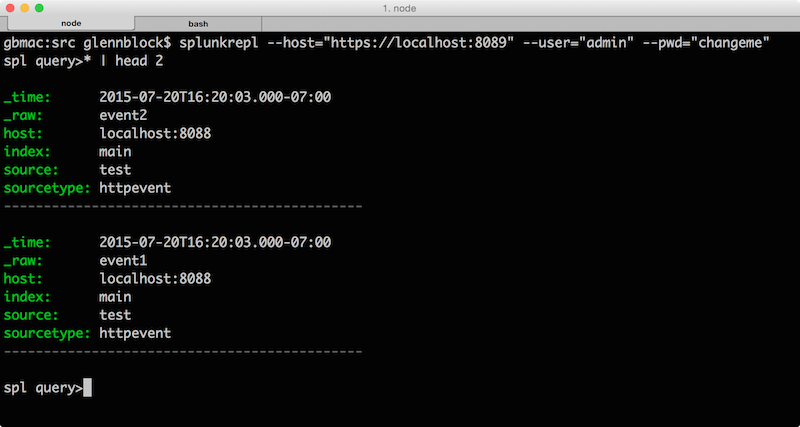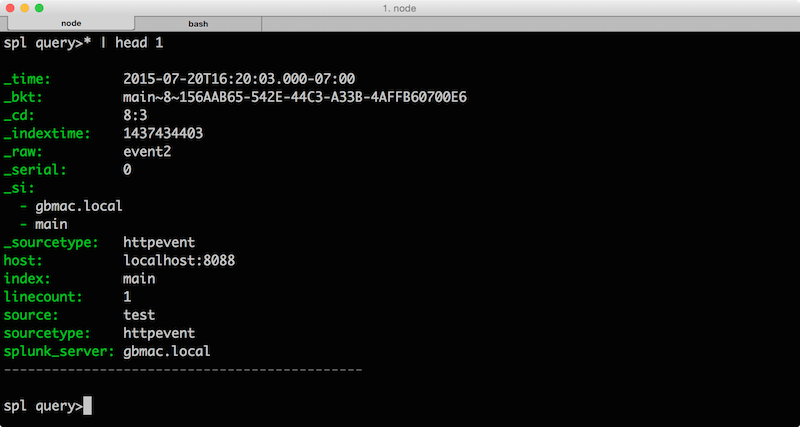splunkrepl
v0.8.1
Published
a node repl for sending SPL queries to Splunk
Downloads
40
Readme
splunkrepl
An awesome little REPL for issuing Splunk queries

What is it?
splunkrepl is an interactive tool for issuing Splunk queries right from the terminal!
Installing
npm install -g splunkrepl
How to use it
splunkrepl works both in an interactive REPL mode and as a non-interactive executor.
REPL
- Run "splunkrepl" at the terminal, passing in optional params of
--host,--userand--pwd.
REPL Commands
All REPL commands use positional arguments.
:connect
Allows you to connect to a Splunk instance.
Argument | Description
-------- | --------------
host | Optional. Specifies the host to connect to. Will default to host from config.
user | Optional. Specifies the user. Will default to user from config.
pwd | Optional. Specifies the password. Will default to pwd from config.
Examples
:connect localhost admin changeme:connect https://localhost:8089 admin changeme:connect https://localhost:8089
:web
Opens the Splunk Web UI and sends a query
Argument | Description -------- | -------------- query | Optional. Specifies the query to send to Splunk. Will default to the last query issued.
Example
:web * | head 10
:set
Stores a command in memory using the specified key. splunkrepl allows you to store an arbitrary number of commands which you can retrieve for later use. The commands are automatically loaded on startup from the .splunkrepl file in the home directory.
Argument | Description -------- | -------------- key | Required. Specifies the key. Must not contain spaces. value | Required. Specifies the value. Anything after the key will be taken verbatim
Note: The keys host,user,pwd,port and webport set the default connection parameters as well as the port to use for the :web command.
Examples
:set myconn :connect localhost server1 admin changeme:set head10 * | head 10:set main_sourcetypes * | stats count by sourcetype, source
:get
Gets the value and immediately executes it as if the user typed it in.
Argument | Description -------- | -------------- key | Required. Specifies the key to retrieve. Must not contain spaces.
Example
Using head10 from the previous example
:get head10
will result in the query * | head 10 immediately being executed.
:list
Lists all key/values from configuration.
:save
Saves all commands to the .splunkrepl file. If you do not save changes they will be discarded when you exit the REPL.
Non-Interactive
- Run "splunkrepl" at the terminal, passing in required params of
--host,--userand--pwdand also passing--query
Command arguments
Argument | Description
-------- | -----------------
--host | Splunk host to connect to including the port, ex. "https://localhost:8089"
--user | Splunk user to connect with
--pwd | Password for the Splunk Account
--query | SPL query to immediately execute. Runs in non-interactive mode
--verbose | Return as much detail as possible within each event (see below)
--json | Send all output in JSON
Tables
When the results that are returned are calculated (do not have _raw) such as from stats or table, then a table view will be displayed:

Verbose mode
By default when queries run, splunkrepl will return only _time, source, sourcetype, host and _raw (if available) fields. To get all the details specify --verbose and you will get output similar to below:

License
splunkrepl is licensed under the Apache License 2.0. Details can be found in the file LICENSE.
Release notes
Check the change log here
